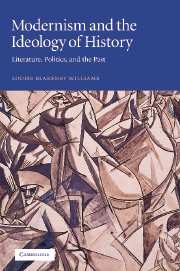Book contents
- Frontmatter
- Contents
- Acknowledgements
- Abbreviations
- Introduction
- 1 “Immaterial pleasure houses”: the initial aesthetic dilemma
- 2 “A more dream-heavy hour”: medievalist and progressive beginnings
- 3 “Pedantry and hysteria”: contemporary political problems
- 4 “A certain discipline”: radical conservative solutions
- 5 “A particularly lively wheel”: cyclic views emerge
- 6 “Our own image”: the example of Asian and non-Western cultures
- 7 In “the grip of the … vortex”: the proof of Post-Impressionist art
- 8 The “cycle dance”: cyclic history arrives
- 9 “The Nightmare” and beyond: the First World War and mature cyclic theories
- Conclusion
- Notes
- Index
Introduction
Published online by Cambridge University Press: 22 September 2009
- Frontmatter
- Contents
- Acknowledgements
- Abbreviations
- Introduction
- 1 “Immaterial pleasure houses”: the initial aesthetic dilemma
- 2 “A more dream-heavy hour”: medievalist and progressive beginnings
- 3 “Pedantry and hysteria”: contemporary political problems
- 4 “A certain discipline”: radical conservative solutions
- 5 “A particularly lively wheel”: cyclic views emerge
- 6 “Our own image”: the example of Asian and non-Western cultures
- 7 In “the grip of the … vortex”: the proof of Post-Impressionist art
- 8 The “cycle dance”: cyclic history arrives
- 9 “The Nightmare” and beyond: the First World War and mature cyclic theories
- Conclusion
- Notes
- Index
Summary
Edwardian Britain, despite a century's distance with which to judge it, remains an enigmatic period for the historian. As early as 1935 George Dangerfield challenged the simplistic myth of “the Edwardian garden party,” the “golden afternoon” before the deluge remembered through the tarnished lenses of those who had experienced the First World War. Dangerfield found the story of Britain between 1910 and 1914 to be “a far more curious drama” than that of a country “dancing its way into war, to a sound of lawn-mowers and ragtime, to the hum of bees and the popping of champagne corks.” Rather, the period as he described it was one of confrontation and conflict, tension and transition.
For Dangerfield above all the drama revolved around the fact that “true pre-war Liberalism” “was killed, or killed itself, in 1913.” A similar murder was committed in the intellectual history of the period. Among one group of thinkers in particular a “strange death” occurred in their concept of history. On or about the year 1913 the idea of progress died.
Fortunately, death is not the only story in Edwardian Britain. And it is possible to view the age not simply as the sunset of the preceding century, but also as the dawn of much that we consider modern. As Dangerfield himself acknowledged, the “extravagant behavior of the post-war decade, which most of us thought to be the effect of war had really begun before the War. The War hastened everything – in politics, in economics, in behavior – but it started nothing.”
- Type
- Chapter
- Information
- Modernism and the Ideology of HistoryLiterature, Politics, and the Past, pp. 1 - 20Publisher: Cambridge University PressPrint publication year: 2002



